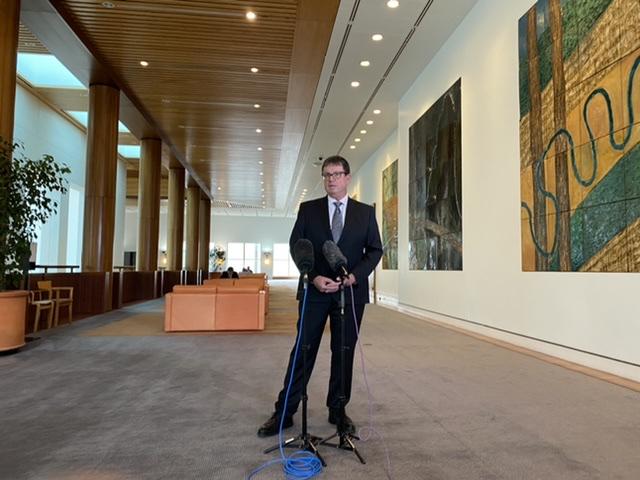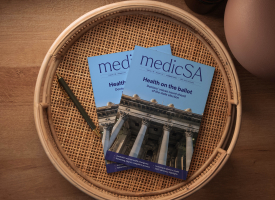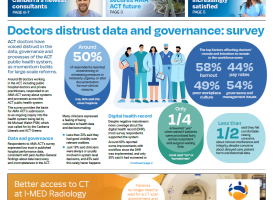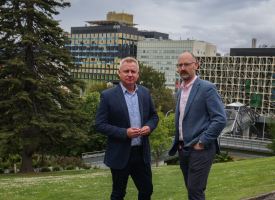Launch of the AMA's new report: Hospital exit block - A symptom of a sick system.
Transcript of AMA President, Professor Stephen Robson, speaking at a press conference at the Mural Hall Parliament House in Canberra today on the issue of exit block in the public hospital system and launching the AMA's new report Hospital exit block: A symptom of a sick system.

STEVE ROBSON: Hi, I'm Steve Robson, Federal President of the Australian Medical Association, and I'm here today to launch our report on exit block. It's part of our End the Hospital Logjam campaign, and findings that we have to present today are startling. Exit block is a huge problem; it means that Australians who don't need to be in hospital occupy hospital beds because there is nowhere for them to go. You typically see this with people who need residential aged care, sometimes it's NDIS and sometimes it's just people whose social circumstances mean they don't have an option to leave. But it's a massive problem, because Australians who don't need care occupying hospital beds take away the opportunity for elective surgery, for other hospital admissions. And we've looked at the data from the last financial year available in Australia and we estimate that 285,000 patient days were lost to exit block, and we've estimated that the costs of this could be up to potentially $2.1 billion a year for the health system.
Exit block is a massive problem. It denies healthcare to people who need elective surgery, and it sends our emergency departments into logjam, and contributes to problems like ambulance ramping because patients who need admission to hospital can't leave the emergency departments, because the beds are occupied by people who don't need to be there. It's a problem that needs a national approach, and we're calling for that today.
QUESTION: When you said 285,000 patient days, what does that mean, patient days?
STEVE ROBSON: It means that around the country in the financial year, 285,000 beds were occupied by patients who didn't need to be there. So, they are 285,000 beds across the financial year that could have been occupied by patients who can't get elective surgery, can't be admitted through emergency departments. It's a major problem.
QUESTION: Do you have the number of actual patients, as opposed to patient days?
STEVE ROBSON: Yeah. So, a typical figure was from November last year where there were 1000 patients in hospital who did not need to be there for care, and their average stay can be up to 160 days in some circumstances.
QUESTION: That's because there's nowhere to send them. There's not enough aged care home places, that sort of thing.
STEVE ROBSON: So, the problem is multiple- the biggest thing is older Australians who don't have residential aged care to go to. But in some circumstances, there are patients who need NDIS care, and that's an area where we have had some success in dealing with the issue.
QUESTION: Last year the Group of Eight, on another topic, called for an increase from the Federal Government for medical student placements, about 1000 over four years. Have you had any update on that, and do you think that that number's sufficient?
STEVE ROBSON: Yeah, I think the key issue at the moment is that the doctors that we train want to go into general practice, so that's an absolute key driver. So, we agree with that.
QUESTION: Clearly, but with the bed block you need more places for these people to go. We don't have enough staff in aged care homes to cope with the people who are there.
STEVE ROBSON: Yeah.
QUESTION: This is not something that we can fix quickly, is it?
STEVE ROBSON: It's not something you can fix overnight, but there are multiple levels that you can deal with this. First of all, it's possible to have people who can coordinate the beds that are available, so often there is a disconnect and people aren't aware of the resources available.
Secondly, sometimes there are models where subacute care is connected to the hospital. They're like a halfway house that a patient can go to while they're awaiting an aged care place, but you're absolutely correct. In the long term, we need more residential aged care places to take the pressure off our hospitals.
QUESTION: And we know that the government's wanting to put more nurses into aged care – 24/7 nurses. Some aged care homes are saying: well, we don't have the staff for that, we might have to shut down. That means less places, and then the logjam will be worse.
STEVE ROBSON: Absolutely, and we know this has to require a national approach. And one of the big things we're seeing in Australia is the healthcare workers, whether they're nurses, doctors, anybody who works in healthcare are thinking about leaving the profession. We need a national approach to make sure that we recruit and retain and look after healthcare workers, nurses in aged care right across the spectrum.
QUESTION: And immigration's part of that, I suppose…
STEVE ROBSON: Absolutely. For a long time, Australia has relied on skilled migration. That's another aspect, that went into some abeyance during the COVID pandemic. And of course, other countries now have a need for their own healthcare workers, but we need to look at it nationally and with an equitable program we can make sure that Australia's patients have the healthcare workforce they need to look after them.
QUESTION: It seems every week you're here with another report highlighting how terrible our health system is. Is it really falling to pieces?
STEVE ROBSON: We know there have been a lot of strains on Australia's health system for many years, and the pandemic has made things worse. We know there are problems in Australia to being able to get an appointment with the GP, to afford that appointment, to have elective surgery done, to have care in a timely manner in our emergency departments and to afford medications. There are multiple challenges, but the only way we're going to deal with them and get Australia to a system of healthcare that Australians expect is by taking a national approach and looking at all the problems and trying to deal with them.
QUESTION: There is $750 million that the government's committed to strengthening Medicare. GPs are saying that's less than $10 a patient and it'll do nothing.
STEVE ROBSON: Yeah. The Strengthening Medicare Taskforce report was released last week. It details $250 million a year over three years. We welcome those changes. The report has a lot of long overdue reform that will make healthcare more efficient in the long term. But the problem is there's nothing in the report and nothing in the outcome from National Cabinet last Friday that makes it easier to see a GP tomorrow, that makes it easier to afford that care, that makes it easy to get a planned operation or takes pressure off our emergency departments. So, while we welcome unequivocally the Strengthening Medicare Taskforce report, a lot more has to be done.
QUESTION: If this bed lock isn't addressed, what's going to happen? It's going to get worse unless people can get into hospital when they need it
STEVE ROBSON: The Productivity Commission last week released a report showing the dire straits that many aspects of the health care system are in. And we're seeing worse and worse waiting times, longer waiting times and poor performance in emergency departments around the country. When we looked at planned surgery and emergency department performance of the 201 public hospitals around the country that have both these services, only three were meeting the targets. That's down from 15 a year to four. Bad but getting worse, and we know that every element of the healthcare system has to be addressed if we're going to get things back on track for our families.
QUESTION: And on COVID, the government's today announcing an extra booster shot for anyone who hasn't had one or hasn't had COVID. Do you think that's a good idea?
STEVE ROBSON: Yeah, absolutely. We strongly support the booster program. The problem is that it's really stuck in the mud at the moment. We know that less than three quarters of Australians ultimately had a third dose and fewer than half of eligible Australians actually got a fourth booster. We welcome availability. The new boosters actually will cover the original COVID and the newer Omicron strains, but we're seeing a lot of COVID vaccines being thrown out. We need a real boost to the vaccination campaign to get Australians back on track.
QUESTION: So, should they focus on those original boosters rather than worrying about a fourth and a fifth one?
STEVE ROBSON: We need to make sure that every Australian who's eligible has access to a vaccine booster and to make sure that they're enthusiastic about taking it up, to look at the big picture about preventing death across the whole community. We saw 5000 Australians; older Australians die from COVID. It's a terrible situation and vaccination is one aspect, one way the community can get together to protect the most vulnerable Australians.
QUESTION: On another topic, data- I can't remember quite when it came out but showed that the smoking uptake is reducing less in Australia than in places like Norway and the UK. There are some people claiming that that's because we are taking a harder line on vaping.
STEVE ROBSON: Yeah, I think that Australia had enormous public health success in dealing with tobacco smoking. But big tobacco has invested heavily in vaping. We know that there's some evidence that nicotine vaping may play a role in smoking cessation. But we're very, very concerned about recreational vaping and particularly cooking a new generation of Australian kids. It's a situation that's a concern around the country and it's an evolving public health disaster. So, we need to tackle all forms of addiction like this to try to stop the next generation facing the public health consequences. I agree with you, it's a major problem.
QUESTION: Can we still classify our health system as among the best in the world, despite all these issues that you're raising?
STEVE ROBSON: Just before the pandemic, Australia had fallen from being the third most efficient health system in the world to the tenth. It's still a good position to be in but we're not sure how we're travelling with COVID, and I think Australians expect in this country to have a great health system. And we support all measures that will put Australia back at the top of table for health efficacy and outcomes on a global level.
QUESTION: Thank you.
STEVE ROBSON: Cheers.
* * END * *
|
8 February 2023 CONTACT: 02 6270 5478 0427 209 753 media@ama.com.au
Follow the AMA Media on Twitter: http://twitter.com/ama_media
|



